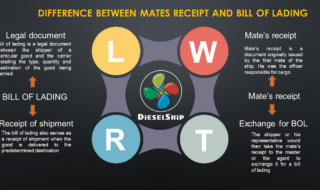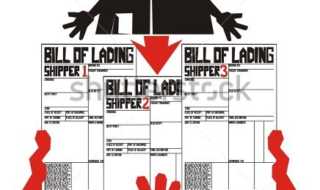Obligations of the Bill Of Lading

Obligations of the Bill Of Lading
The holder of the Bill of Lading (Buyer, Endorsee, Assignee) is bound by same condition as the consignee himself.
Ex. If the consignee is required to pay the freight on delivery, the general average contribution to be paid or difference of freight, the holder has to do the same.
Bill Of Lading Made In Sets
Bill of Lading is generally made in sets of 3 or more.
- Consignor’s copy
- Consignee’s Copy
- Ship’s Copy
The ship’s copy will be retained onboard. The consignor & consignee’s copy will be handed over to the consignor. The consignor will retain his copy and send the consignee’s copy to the consignee to help the consignee to take delivery of the cargo. The consignee has to surrender the Bill of Lading to take delivery of the cargo. The surrender of consignee’s copy is the proof of delivery of cargo. In case of cargo claims, endorsement will be made on the ship’s copy or separately to enable the consignee to prefer cargo claims. Sometimes the colour of Bill of Lading itself is different for easy identification and prevention of abuse. Often more than three copies are prepared when the consigner & consignee are protected by Bank guaranties. Therefore additional copies of Bill of Lading will be prepared for consignor’s bank, consignee’s bank & for Insurance.
Sometimes when a large quantity of cargo is dealt with then several Bill of Ladings, which are split up to smaller quantities are made for the reason of commercial convenience.
Delivery Of Cargo
The delivery of cargo must be affected only on the presence of Bill of Lading. If due to any reason the carrier delivers the cargo without collecting the bill of lading he will be liable for the cargo claims at a later date when someone else presents the Bill of lading and demands the delivery of cargo.
Place Of Delivery
The cargo is required to be delivered against the Bill of Lading to the shipside only. (Jetty & Barges) (Your responsibility is till ‘hook on to off’ or ‘Sling on to Sling off).
Life Of Bill Of Lading
The Bill of Lading must be kept for a minimum period of 3 years or till the cargo claims are settled, whichever is later.
Notice of Damage or Loss
In case loss or damage of cargo is noticed at the time of delivery then a written notice must be given within 24 hours if it is open cargo and 72 hours for closed cargo. If in case it’s not done the right to cargo claims are lost.
Cargo claim suits
If after giving the notice of writing and still the client has not settled, the consignee must file a suit in the court before:
- One Year in terms of Hague Visby Rules
- Two Years in terms of Hamburg or Rotterdam Rules.
Legal status of Bill of Lading
Bill of Lading is a valid document readily admitted and accepted by court without any witness or proof.
Particulars found in Bill of Lading
- Details Of Consigner, Consignee & Cargo.
- Description Of Cargo.
- Volume or Weight of cargo.
- Value of cargo.
- Port of load & discharge of cargo.
- Alternate port of loading & discharging.
- Apparent order & condition of cargo.
- Freight payable by whom, when, where & at what currency.
Note: Sometimes the terms and conditions of carriage are printed at the rear of Bill of Lading.


